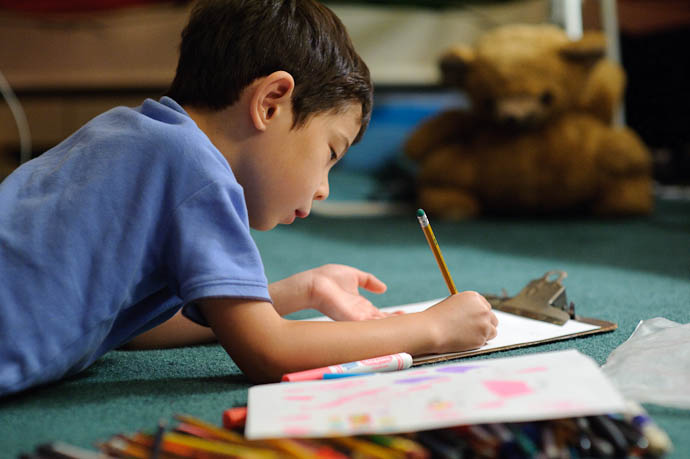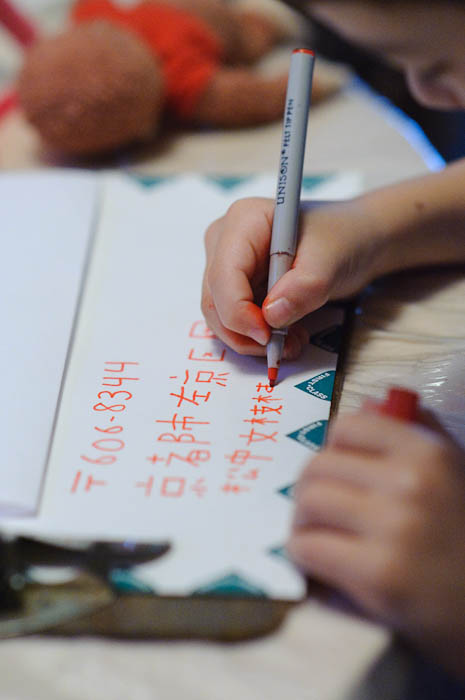
Nikon D700 + Nikkor 85mm f/1.4 — 1/100 sec, f/2.2, ISO 4500 — map & image data — nearby photos
Letter to Mommy
While we've been on our trip to The States, Anthony heard that Mommy had progressed to a new level in her ballet dancing, so he wanted to send her a letter to congratulate her...

Nikon D700 + Nikkor 85mm f/1.4 — 1/100 sec, f/2.2, ISO 2800 — map & image data — nearby photos
Addressing
Anthony can write Hiragana fine (one of the three Japanese scripts), but he can't yet write kanji (“Chinese characters”) except his name, so I wrote the address and had him copy it. It's not a good idea to do this very much, because the order that the strokes of each character are written is very important, so no experience is better than untrained experience. But doing it once won't hurt, and I thought Mommy might appreciate to see his efforts.
We're heading into the last week of our trip soon... then back on a plane for Kyoto, where I have a month of unread email waiting...

When I look at the photos from my childhood, my mom always had us girls posed, smiling into the camera (and the sun :). I think photos tell the best stories when people are not looking directly into the camera, these shots being a prime example. Love Anthony’s artwork – he is quite the artist! Your wife must really enjoy getting these letters!
It depends on which story you’re telling, and when. Take 20 years worth of annual photos your mom took, line them up, and I’d be surprised if you didn’t end up with one heck of a story. —Jeffrey
I’m not so sure about that “no experience is better than no experience.”
Genbo is into writing some kanji now too, and his stroke order is not correct. Still, I think it’s much more important that he experience the thrill of writing kanji and the positive feedback from adults it offers. Changing stroke order when he learns the kanji officially in school is not such a big deal. (Indeed, I think the “stroke order has to be correct or he shouldn’t do it at all” position is reminiscent of the paralyzing fear of trivial error that makes Japanese people so bad at any kind of language acquisition at all.)
Genbo is a lot younger than Anthony…. Anthony is at the stage where he can write hiragana with the proper stroke order, and so will develop kanji habits quickly. Bad habits, writing or otherwise, are notoriously difficult to break (my brother still picks at his fingernails, 40 years later), and bad habits in writing kanji will make you look stupid down the line, just like using poor grammar or pronunciation. I know foreigners who have lived in Japan for 50+ years, with native-level grammar and vocabulary, but who are difficult to understand because their pronunciation, developed 50+ years prior when they first tried to learn Japanese as an adult, is horrible, thickly American or Belgian or wherever they came from. Bad habits are much easier to break if they’re not formed. —Jeffrey
Interesting topic about breaking habits.
It has been my experience that it’s possible to break bad habits if you put your mind to it. But the key is that you have to be motivated to do so. It doesn’t matter how much other people tell you to change; you won’t do it until you decide for yourself. I have some bad habits in my Japanese skills that stem from 10 years ago, and I know they’re wrong to the point that I correct myself immediately every time, but I just don’t prioritise them highly enough to fix them.
Another example: until early this year, my wife used to bite her nails almost every day. It’s a habit she picked up in her childhood and it just never stopped. For years, every time I saw her doing it I asked her to stop it, but it didn’t matter how much I tried to persuade her that her nails could be beautiful – she never did. So what changed? Earlier in the year she suddenly decided to try to grow her nails. It was her own decision, and she just did it. It was amazing to see: slowly her poor tiny little nails grew longer, and she was stunned at how quickly they became nice normal nails, and then pretty nails. She was very upset when one of them broke, and she realised (for the first time) how fragile nails can be, and she used nail clippers on her fingernails for the first time in her life. (!) Now, months later, she still has beautiful nails. In a single stroke, she quit a habit that she’d had for as long as she could remember.
Getting back to the original topic, in the case of children, I can see how getting into bad habits could be tricky to fix: unless the kid in question is highly motivated to fix their own behaviour for themselves, their teachers/parents may just end up banging their heads against the wall in frustration.
By the way, do addresses in Kyoto usually start with 京都市 rather than 京都府? I guess writing both would be redundant. We have the same situation here with 秋田県秋田市, but if I were writing from outside the prefecture (or the country) I would probably write both.
We just leave the 京都府 off…. everyone does when writing. I also often leave the 左京区 off as well. Frankly, the postal code gets it to within a couple of hundred yards of me, so the building name and the postal code are likely sufficient. Once I got something address to, and I quote the address in full, “Jeffrey Friedl, Kyoto Japan” The Japanese post office is amazing. —Jeffrey
I think the point about how hard it is to break habits is a valid one. I just don’t think that Anthony, unless he gives up all other forms of play for writing kanji in his spare time, is going to develop real, muscle-memory based habits at his tender young age. At least, not before they teach him the right stroke order in school anyway.
If my actual experience with my own child and the English alphabet is at all more reliable than your baseless conjecture, I can report that you are very wrong. Writing habits and tendencies form almost immediately, and in an unguided environment, they will rarely solidify in a way that benefits the child. For his English I’ve been very lax, because the penalty for poor writing is that people thing you’re a doctor. It’s a heck of a lot more important for Japanese. —Jeffrey
Dang, you have failed to fall for my attempt to use your son as an experiment to figure out how much I need to pay attention to Genbo’s writing habits!